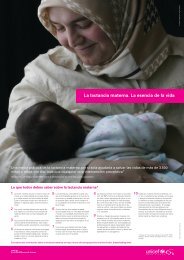SEXUAL ABUSE AND EXPLOITATION OF BOYS IN SOUTH ASIA A ...
SEXUAL ABUSE AND EXPLOITATION OF BOYS IN SOUTH ASIA A ...
SEXUAL ABUSE AND EXPLOITATION OF BOYS IN SOUTH ASIA A ...
You also want an ePaper? Increase the reach of your titles
YUMPU automatically turns print PDFs into web optimized ePapers that Google loves.
Unlike other countries in South Asia, the demand in Sri Lanka is highest for older boys, aged<br />
15 to 17. They make more money and have more bargaining power than younger boys, who<br />
often only receive gifts in exchange for sexual services. While some offenders have provided<br />
extensive support to boys, including boats or houses for their parents, most boys make little<br />
more than pocket money. Research has shown that boys spend little on their own basic needs<br />
and provide little money to their families; nearly two-thirds of their income is spent on drugs,<br />
alcohol, recreation and entertainment.<br />
In terms of preventing sexual exploitation and withdrawing boys from exploitative situations,<br />
perhaps the most challenging features of the Sri Lanka sex industry are boys’ ‘willingness’<br />
and the complicity of families in their exploitation. Interviews with boys in prostitution<br />
showed that 74 per cent were willingly involved, with no force or coercion. 412 Drug abuse is<br />
significant in keeping boys in sexually exploitive situations, and 54 per cent of boys<br />
interviewed said the primary purpose of earning income was to buy drugs.<br />
The situation of boys being sexually exploited in prostitution in Sri Lanka belies the situation<br />
common to much of South Asia, where the causes are poverty, family separation, exploitive<br />
labour and lack of awareness. Some researchers claim that poverty is not a primary cause in<br />
Sri Lanka because there is little extreme poverty in the areas most prone to sexual<br />
exploitation. A 2002 study found that only one-quarter of the boys were from ‘very poor’<br />
families; the majority were from ‘poor’ and ‘not so poor’ families. 413 But there are indications<br />
that families push children into prostitution to supplement insufficient incomes.<br />
Nor does lack of parent or community awareness seem to be a major causal factor. Children<br />
are relatively well educated, media coverage of the issue is adequate and there is a high level<br />
of awareness of sexual abuse and exploitation, including that of boys, compared to other parts<br />
of the region. The 2007 study involving 1,500 parents and guardians found that over 90 per<br />
cent were aware that sexual abuse could be committed by international travelling offenders,<br />
and more than three-quarters were aware that abuse could be committed by local offenders.<br />
Although poverty and lack of awareness certainly contribute to the sexual exploitation of Sri<br />
Lankan children, researchers, NGOs and the government identify the erosion of family<br />
protective systems as a primary cause of children becoming sexually exploited through<br />
prostitution in the country. Sri Lankan researchers have extensively studied the disruption of<br />
family protective environments and its effect on the vulnerability of boys to sexual<br />
exploitation. 414 Strategies and activities to directly address family dysfunction are found in<br />
government policy and programme interventions. In other countries of South Asia, these<br />
linkages have been insufficiently explored by research and insufficiently addressed in policy<br />
and programming.<br />
Family fragmentation, particularly the migration of mothers, is frequently cited by researchers<br />
and policymakers as a cause for the relatively high incidence of domestic sexual abuse. It is<br />
412<br />
International Labour Organization (S. Amarasinghe), 2002, op. cit.<br />
413<br />
Ibid.<br />
414<br />
For example, Weeramunda, A.J., 1994, ‘Child prostitution or poverty’ in Economic Review, May-June 1994;<br />
and de Silva, H., 2000, ‘Child abuse in Sri Lanka’, in Partners in the Judicial Process on Child Labour.<br />
131










